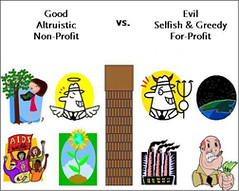Whole Foods Market, Inc. (Whole Foods) has completed its investigation into CEO John Mackey’s online financial message board postings related to Whole Foods and Wild Oats Market (Wild Oats). The fiasco began months ago after it was revealed that Mackey posted disparaging remarks about Wild Oats on Yahoo financial boards using the anonymous name “Rahodeb.” He did this for years, stopping several months prior to the Whole Foods acquisition of Wild Oats.
The result was one of the biggest games of “you say tomato, I say tomoto” in recent history, with some people insisting it was all good fun (including Mackey before he admitted a lack of judgment) and some people claiming it is an ethical breach of his fiduciary duty with the insistence that he be immediately removed as CEO.
The Whole Foods Board, led by Rahodeb and including "Divad," "Nhoj," "Elleirbag," "Ssah," "Sirrom," and "Hplar," has reaffirmed its support of Mackey. (By the way, Divad, Nhoj, and Hplar led the "independent" investigation.)
So why did they say tomato? They won't say. It’s a secret.
“The Company and the Board intend to cooperate fully with the SEC in completing its related inquiry. Due to the ongoing SEC inquiry, the Company and the Board have no further comment at this time.”
Instead, they have turned over their investigation to the Securities and Exchange Commission (SEC), which is charged with determining if Mackey violated the law. I do not envy the task; exonerating Mackey will smack as permission for more colorful CEOs to do the same. Not to mention, the media, which was once sympathetic to Mackey, is starting to lose their patience with the whole sordid story.
They have several reasons. Mackey’s activities were carried out despite knowledge of them by senior executives and several knew of the postings as of 2001, according to three people familiar with the matter, reports The Wall Street Journal. The independent investigation no longer looks so independent. The company will not comment further. And, the longer it takes to resolve a crisis communication situation, the less likely the media will be on your side.
So why did they say tomato? That’s no secret. It’s simple.
The Whole Foods Board has nothing to lose by doing so. If the SEC does decide to call Mackey’s antics less than vine ripe, then it simply has to announce something like this … “In light of the SEC investigation, which uncovered additional information, we have decided to say tomoto instead of tomato.” And then call the whole thing off.

The result was one of the biggest games of “you say tomato, I say tomoto” in recent history, with some people insisting it was all good fun (including Mackey before he admitted a lack of judgment) and some people claiming it is an ethical breach of his fiduciary duty with the insistence that he be immediately removed as CEO.
The Whole Foods Board, led by Rahodeb and including "Divad," "Nhoj," "Elleirbag," "Ssah," "Sirrom," and "Hplar," has reaffirmed its support of Mackey. (By the way, Divad, Nhoj, and Hplar led the "independent" investigation.)
So why did they say tomato? They won't say. It’s a secret.
“The Company and the Board intend to cooperate fully with the SEC in completing its related inquiry. Due to the ongoing SEC inquiry, the Company and the Board have no further comment at this time.”
Instead, they have turned over their investigation to the Securities and Exchange Commission (SEC), which is charged with determining if Mackey violated the law. I do not envy the task; exonerating Mackey will smack as permission for more colorful CEOs to do the same. Not to mention, the media, which was once sympathetic to Mackey, is starting to lose their patience with the whole sordid story.
They have several reasons. Mackey’s activities were carried out despite knowledge of them by senior executives and several knew of the postings as of 2001, according to three people familiar with the matter, reports The Wall Street Journal. The independent investigation no longer looks so independent. The company will not comment further. And, the longer it takes to resolve a crisis communication situation, the less likely the media will be on your side.
So why did they say tomato? That’s no secret. It’s simple.
The Whole Foods Board has nothing to lose by doing so. If the SEC does decide to call Mackey’s antics less than vine ripe, then it simply has to announce something like this … “In light of the SEC investigation, which uncovered additional information, we have decided to say tomoto instead of tomato.” And then call the whole thing off.






















